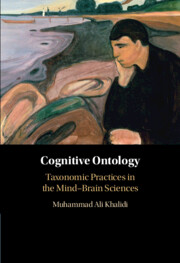Book contents
- Cognitive Ontology
- Cognitive Ontology
- Copyright page
- Dedication
- Contents
- Figures
- Contributors
- Preface
- Chapter 1 Cognitive Kinds
- Chapter 2 Concepts
- Chapter 3 Innateness
- Chapter 4 Domain Specificity
- Chapter 5 Episodic Memory
- Chapter 6 Language-Thought Processes
- Chapter 7 Cognitive Heuristics and Biases
- Chapter 8 Body Dysmorphic Disorder
- Chapter 9 Epilogue
- References
- Index
Chapter 4 - Domain Specificity
Published online by Cambridge University Press: 15 January 2023
- Cognitive Ontology
- Cognitive Ontology
- Copyright page
- Dedication
- Contents
- Figures
- Contributors
- Preface
- Chapter 1 Cognitive Kinds
- Chapter 2 Concepts
- Chapter 3 Innateness
- Chapter 4 Domain Specificity
- Chapter 5 Episodic Memory
- Chapter 6 Language-Thought Processes
- Chapter 7 Cognitive Heuristics and Biases
- Chapter 8 Body Dysmorphic Disorder
- Chapter 9 Epilogue
- References
- Index
Summary
This chapter considers the cognitive construct, domain specificity, which is invoked in a number of different research programs in cognitive science, to indicate cognitive capacities that are limited in certain ways. Some cognitive capacities are restricted in their application to a certain domain, whereas others range freely beyond that domain. The challenge arises in saying what constitutes the domain of a capacity, especially since areas of knowledge do not come neatly compartmentalized. Building on the work of some cognitive scientists, I argue that the best way to understand the proper domain of a cognitive capacity is by invoking evolutionary considerations. This means that domain-specific capacities are individuated etiologically (at least in part), based on their evolutionary history. They are also identified on the basis of their synchronic causal powers, what they can and cannot do, since domain-specific cognitive capacities cannot range beyond their proper domains (whereas domain-general ones can). Given this cluster of causal features, I argue that there is a prima facie case to be made for considering domain specificity to be a cognitive kind.
Information
- Type
- Chapter
- Information
- Cognitive OntologyTaxonomic Practices in the Mind-Brain Sciences, pp. 100 - 122Publisher: Cambridge University PressPrint publication year: 2023
